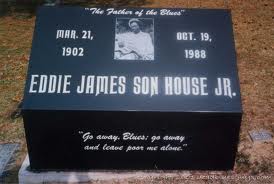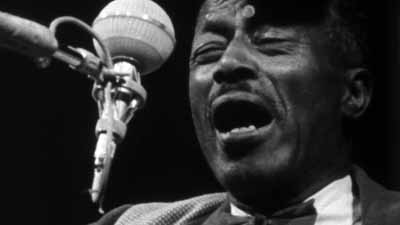Selected Son House Discography (with links to Amazon):
Heroes of the Blues: The Very Best of Son House
The Complete Library of Congress Sessions, 1941-1942
Father Of The Delta Blues: The Complete 1965 Sessions
Martin Scorsese Presents The Blues
King of the Delta Blues
Revisited
Son House & the Kings of the Delta Blues
Son House embodied the Mississippi Delta sound. According to some he was born in 1902 and died in 1988. He played guitar with a bottleneck which gave a unique sound to his music, blues which came from traditional roots grounded in slavery culture. His singing voice gave a moving backdrop to the whole performance, and showed a sermoning influence from early in his life.
 As a depression era man House drifted quite a bit, and from the age of 15 he was speaking in church and became a religious man and a Baptist pastor. In the mid twenties he made his way back to his home ground from Louisiana, and heard guitar played with a bottleneck. He loved the sound, got a few lessons and taught himself the rest. With the passage of the years his sound turned into something distinctively his. He hooked up with Charley Patton after serving time in Mississippi State Penitentiary prison (the famous “Parchman Farm” of song fame) in 1928 for killing a man (which was commonly thought to be self-defense), and in 1930 was invited by Patton to a Paramount Records recording event up north. When Patton died in 1934, House’s personal history made for a difficult life, as the blues themselves were still disreputable in popular culture. So he married, made a living driving tractors, and played music on the side.
As a depression era man House drifted quite a bit, and from the age of 15 he was speaking in church and became a religious man and a Baptist pastor. In the mid twenties he made his way back to his home ground from Louisiana, and heard guitar played with a bottleneck. He loved the sound, got a few lessons and taught himself the rest. With the passage of the years his sound turned into something distinctively his. He hooked up with Charley Patton after serving time in Mississippi State Penitentiary prison (the famous “Parchman Farm” of song fame) in 1928 for killing a man (which was commonly thought to be self-defense), and in 1930 was invited by Patton to a Paramount Records recording event up north. When Patton died in 1934, House’s personal history made for a difficult life, as the blues themselves were still disreputable in popular culture. So he married, made a living driving tractors, and played music on the side.
House was recorded by the legend Alan Lomax in 1941 and ’42,after which time he moved away from Mississippi to escape the difficult life in the rural deep south, landing in New York where he worked as a cook and porter for NY Railroad. He joined the Baptist church and was eventually tracked down in Rochester in the sixties by Nick Perls (the owner of Yazoo Records), Dick Waterman and Phil Spiro who were fans of the music. He came out of retirement to begin playing again. House played in America and even traveled to Europe to perform in blues concerts. His signature playing has been documented in blues articles everywhere and video is also available online for those who love the southern blues. With the passing of all the blues greats he knew (Patton, Willie Brown and pianist Louise Johnson to name a few), his health declined to the point where he exited music altogether, retiring in around 1974, dying in 1988 at his home in Detroit, Michigan. He made some records for Columbia and toured and played festivals intermittently through his retirement, including Newport Folk in ’64 and Montreaux Jazz in ’74.
 Much of Son House’s life was a series of ups and downs in the extreme environment of the post depression deep south, characterized by the void between the church and the blues. During his lifetime, he went to prison, got married, became a Baptist Pastor, drifted from place to place and in and out of jobs and all the while played some of the most gritty, moving, and meaningful blues music to come out of the south. He joined the ranks of the truly great blues musicians of America. And as a recognized person in America’s musical heritage, thank goodness for the Library of Congress recordings, the video saved, and the interviews recorded by historians.
Much of Son House’s life was a series of ups and downs in the extreme environment of the post depression deep south, characterized by the void between the church and the blues. During his lifetime, he went to prison, got married, became a Baptist Pastor, drifted from place to place and in and out of jobs and all the while played some of the most gritty, moving, and meaningful blues music to come out of the south. He joined the ranks of the truly great blues musicians of America. And as a recognized person in America’s musical heritage, thank goodness for the Library of Congress recordings, the video saved, and the interviews recorded by historians.


 US Dollar
US Dollar UK Pound
UK Pound Euro
Euro English
English French
French German
German Spanish
Spanish Russian
Russian
